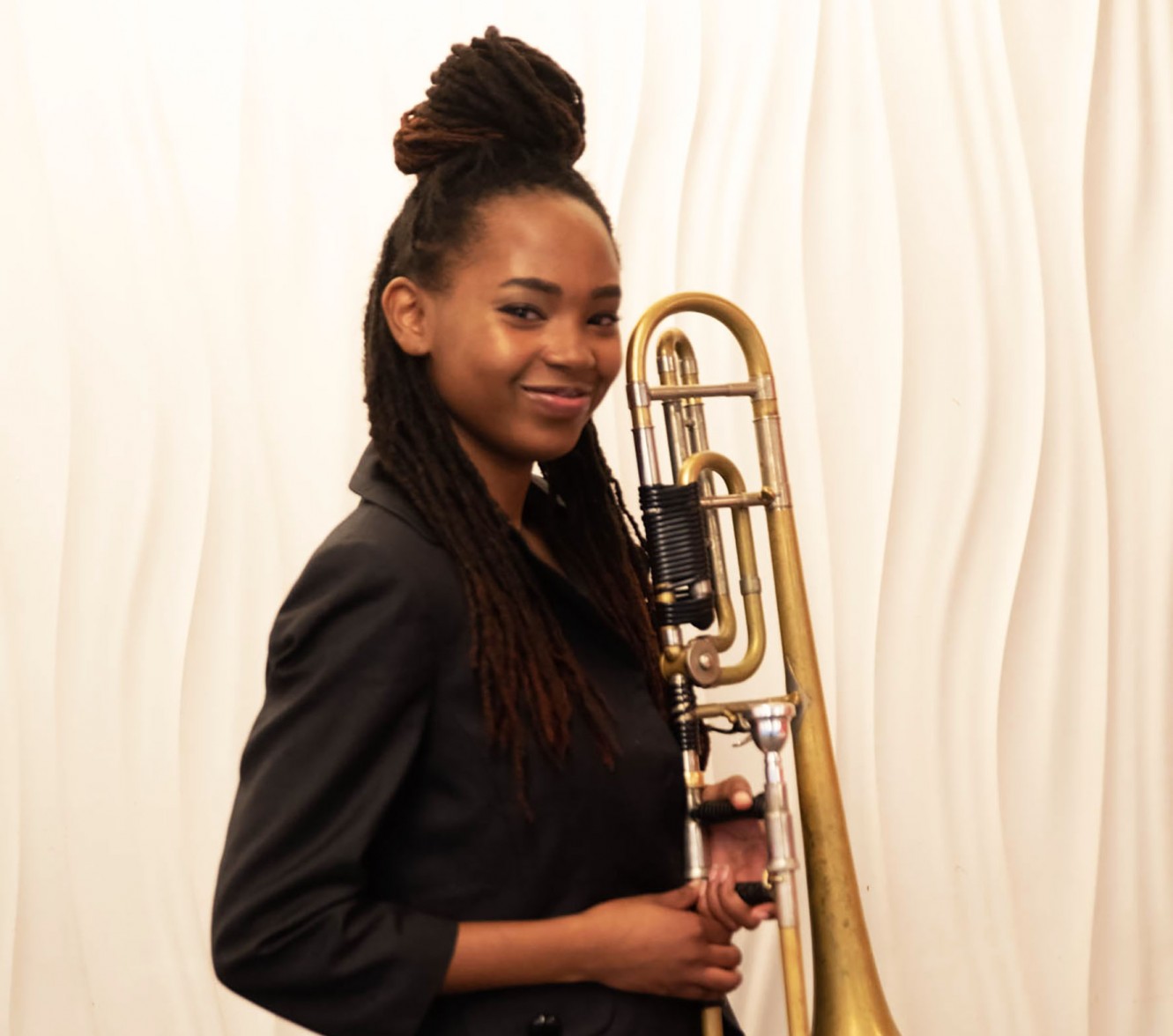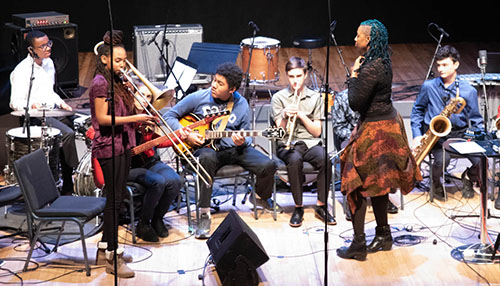
“When I was in 3rd grade I knew I wanted to do music for the rest of my life.”
At age 17, Taj Graves-Parker is already a seasoned musician who first took up the trombone in third grade. A lifelong Bronx resident and a student at Kaufman Music Center’s Special Music School (P.S. 859) since 6th grade, she’s now a high school senior juggling homework and college applications with a packed schedule of rehearsals and performances. A member of Kaufman’s Face the Music since age 11, she’s sharing the stage this season with the likes of Mazz Swift and Helga Davis at Merkin Hall, National Sawdust, Roulette and other cool NYC venues. She made time in her extremely busy schedule to tell us about her experience as a young musician playing adventurous new music and planning for her future.

Taj on stage with Mazz Swift and Face the Music at Roulette
What has your experience at Special Music School been like?
It’s been a really great experience. I met so many kids my age that loved what I loved, which is music. In middle school we had grade concerts, which would terrify everyone, but it was actually a learning experience. I’d look at people my age and realize they try so hard. They practice every day and are really committed. And that was a great experience because I saw people that were my age playing at an adult level. I learned that people my age can really play great music. The idea that I’m surrounded by these great musicians every day is amazing.
What was it like to join Face the Music?
It was an adjustment, because at Special Music School the focus is strictly on classical music. When I joined Face the Music it was all modern composers writing for us kids. So I thought, this music’s kind of weird and interesting, but that was the point. It was modern. It was today. Kids my age were writing music for us. It was very interesting to not just play classical, but other genres so I could expand my horizons.
Why is it important for young musicians to work with living composers?
It’s very important for a young musician to see a composer and talk to them about their works and their score, and actually have a sit-down conversation about what they want. When you’re playing classical music, the majority of the composers are deceased and so you can’t talk to them. To work with someone who made a piece for you and your band, that is really awesome because you have that one-on-one connection and you’re going to make the piece better.
What was it like to work with composer and violinist Mazz Swift, with whom you performed this season at both Roulette and National Sawdust?
It was a very interesting process. It was a great connection. When I met her I was just like, she’s really awesome. She is such an amazing composer, and to work with her was such an amazing opportunity. Because she’s someone who looks like me. Because she also has locks, and she’s also a Black woman who wants to create music. It was such an amazing experience. She taught us a new way to conduct and to show an ensemble how to play music, which was conduction. It’s kind of like sound painting, but more structured. It’s specific, but there are different hand signals that demonstrate a different dynamic or phrasing. Just learning from her to conduct an ensemble, and learning what she does as a musician herself was really profound. This was one of my favorite music projects because I’d never done conduction before. To do it in front of a lot of people, and to do well, was amazing. It was such a great experience.
Do you like to perform?
That’s why I love Face the Music – because it gives me so many opportunities to perform around the city. When I’m on stage I feel comfortable and safe, and I know that it’s going to be a good gig. One of my favorite venues is Roulette, and the other one is National Sawdust. Carnegie Hall was pretty good too.
What are your plans after high school?
I want to be in a great college, conservatory or university that I love and will push me to become a better musician. In terms of a career, I feel like playing on Broadway would be it, but I could go on tour. Anything that involves music and I’ll be happy, because it involves performing. If it leads to me being a professional trombonist, then that’s really cool. I just want to play music for people and share my craft with others. My top college choices are New York University, Mannes School of Music, Boston University and SUNY Purchase.
What’s your favorite part of NYC?
Manhattan, because there are so many things you can do as a musician. You can do Broadway shows, you can go to Alvin Ailey and Carnegie Hall. Juilliard and Lincoln Center are in a 5-block radius from Special Music School, and that’s amazing. To be in a school that’s so close to the places that I actually want to go to, and play in in my future, is incredible.
As a young musician, what kind of impact would you like to have on society?
I feel like as a young person in NYC, you can try, but you don’t know if you’re going to make a big impact. If I can say, hey I’m the only Black person in my ensemble, then I gotta represent. To have a young girl that looks like me saying, she has locks and she’s Black, I could do that too. I want to motivate people who look like me to know that they can do what I did, and beyond if they really put the time in.
Support Face the Music!
Your new or increased donation before March 31 will be doubled up to $10,000, thanks to the Barbara Bell Cumming Charitable Trust.

